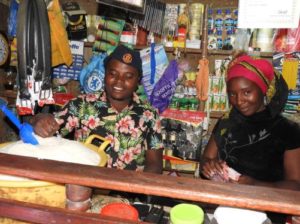
October 2017—As a young mother of three, Prisca Lutego wanted nothing but the best for her family. She dreamed of the day when she could expand her small shop to bring in more income, in turn opening new windows of opportunity for her children. But without the hard cash to turn this dream into a reality – and limited access to credit and banking services – Lutego had few options.
Fortunately, perfect solutions sometimes present themselves in unexpected ways. It all began when Lutego’s central Tanzanian village of Kiponzelo became part of a growing movement to do away with traditional, undocumented systems of land ownership in favor of a formal, government-sanctioned process. This meant clearly documented land claims for villagers, accurately mapped property lines using GPS, better property values, and equal land rights for men and women. And for Lutego, it meant having the security to use her land as collateral.
When Lutego first obtained a certificate of customary right of occupancy (CCRO)—the Tanzanian equivalent of a land deed—she did not realize that a simple document, combined with her newfound understanding of land rights, would open doors she once thought closed to her.
“My husband and I wanted to do more for our family,” she recalled. “I didn’t understand that land is powerful and that I could also have land access—I thought only husbands and fathers could.”
After attending training on women’s land rights under the Feed the Future Tanzania Land Tenure Assistance activity, Lutego soon learned that her ability to own land was entrenched in the constitution and well defined in land-specific legislation. Likewise, her husband Lemmy deepened his understanding of land tenure through informational meetings at the village assembly and hamlet level, laying the groundwork for a better future for their family. Drawing on their newfound knowledge, the couple opted for a joint tenancy CCRO, giving them both an equal right to occupy the land and inherit the property should one of them pass away.
With renewed confidence in their land rights, Lutego and her husband used their CCRO as collateral at Access Bank, successfully qualifying for a TZS 3 million ($1,300) loan. Today, they are quickly on their way to expanding the family business—all thanks to the power of formal land ownership. “We had some awareness before, but not like this,” said Lutego. “My husband sees me as a partner and I feel secure with my rights…I’ll never forget the days I signed a CCRO, and later used it as collateral.”
The Land Tenure Assistance activity is a USAID-implemented effort under Feed the Future, the U.S. Government’s global hunger and food security initiative. By registering an estimated 50,000 plots of land by 2019, the program works to reduce risks related to land tenure and pave the way for future agricultural investment in Tanzania’s rural heartland.

